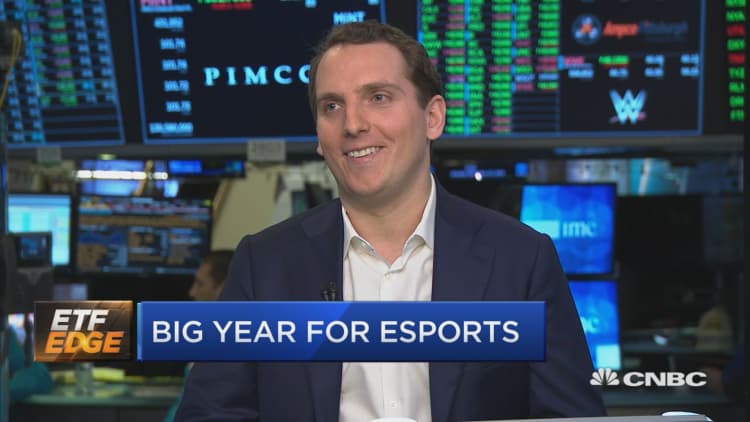Despite a turbulent quarter for the markets, a few relative bright spots have emerged, including gaming-related ETFs.
While the Dow and S&P 500 just posted their worst first quarter on record — respectively by 23% and 20% — gaming-related ETFs managed to outperform the market. VanEck's Gaming and Esports ETF (ESPO), for instance, is up 2% year to date while the ETFMG Video Game Tech ETF (GAMR) has fallen only about 5% amid the big market sell-off.
ETFs focused on esports have also held up relatively well, with the Global X video Games & Esports ETF (HERO) rallying back to early January levels. The Roundhill BITKRAFT Esports & Digital Entertainment ETF (NERD), though down about 12% this year, still stacks up relatively well compared with the broader market.
The gaming industry is seen as well suited for "unique stay-at-home" trends resulting from the coronavirus outbreak, said Roundhill Investments CEO Will Hershey. The lockdowns have also favored stocks like Zoom Video and Netflix since consumers are now searching for at-home entertainment.
"You're now seeing [the market] differentiate between sectors and areas that can actually perform here [given the current environment, and] the data points are bearing it out," he said. "Steam is hitting a new record concurrent player base every weekend, Twitch [is on track to break a new record] for viewership, and that's going to be reflected in companies' earnings."
Verizon reported a 75% week-over-week bump in gaming usage while games like Call of Duty Warzone grew to 30 million players in just nine days following its March 10 release. The quarantine in China also drove a gaming surge for top Asian gaming companies like Tencent and NetEase.

Hershey added that on top of stay-at-home trends giving the gaming and streaming sectors a boost, the games industry also has a history of weathering a downturn.
For example in 2008 and 2009, gaming companies actually saw steady or growing cash flow while the recession took down other sectors and the broader economy, he said.
Now, the industry may be even more resilient.
"Gaming is one of, if not the, cheapest forms of entertainment, and now even more so than 2008 and 2009," given that many games are free to play, Hershey said. "You're talking about a free form of entertainment, even when you're downloading full games."
Hershey said his own ETF, NERD, is down on the year because unlike other gaming and esports ETFs, it focuses exclusively on esports during a time when competitions have been canceled because of the virus outbreak.
As a result, Hershey believes that many of the top holdings initially were part of an across-the-board sell-off as investors initially fled the space, though he maintains that many are in a place to bounce back.
"Huya and Douyu are Chinese game-streaming platforms, which I expect to see accelerated growth during shelter-in-place," he said. "It is likely these names were indiscriminately sold as investors lessened their China exposure. Modern Times Group, on the other hand, is focused on live in-person esports events through its subsidiaries ESL and Dreamhack."
Hershey also said that while revenues are "certainly to be impacted," the same companies could regain revenues. More specifically, he believes that esports-focused companies, as they move online, could still capitalize on advertising and sponsorship dollars given the uptick in stream viewership.
"If anything, I see current circumstances as accelerating a shift from physical to digital," he added. "Esports are uniquely positioned relative to traditional sports to thrive in such an environment."




